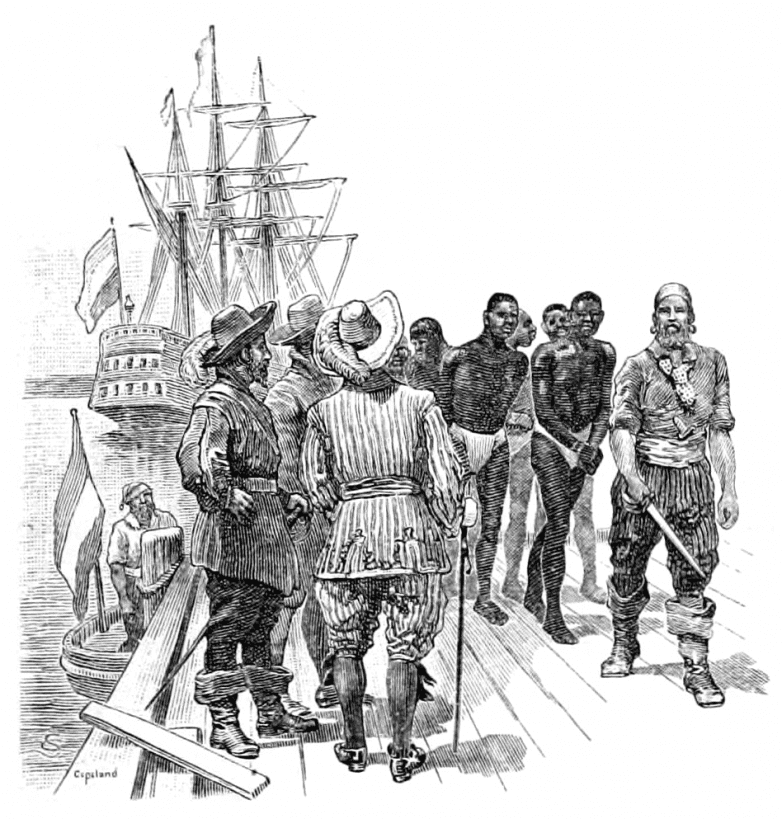Racism, as manifested by slavery, has been described as America’s Original Sin. But is racism the essence of America, the distinguishing characteristic of our history, our culture, and our national identity?
Some of our presidential candidates suggest that it is. “This country, though we would like to think otherwise,” said Beto O’Rourke, “was founded on racism, has persisted through racism, and is racist today.” Bernie Sanders has said much the same thing.
But the New York Times is taking this further with its 1619 project [subscription required], commemorating the first arrival of 20 African slaves brought to Jamestown on August 20, 1619, 400 years ago. The newspaper is publishing a series of articles that seeks “to reframe the country’s history, understanding 1619 as our true founding, and placing the consequences of slavery and the contributions of black Americans at the very center of the story we tell ourselves about who we are.”
It isn’t just replacing 1776, the issuing of the Declaration of Independence, or 1789, the signing of the Constitution, with 1619 as the birth of our nation. The contention is that virtually everything about America–our economy, our political system, our culture, the very food we eat–is tainted by racism. “In the days and weeks to come,” says the New York Times, “we will publish essays demonstrating that nearly everything that has made America exceptional grew out of slavery.”
So much for “American exceptionalism”! It’s hard to imagine how anyone who believes this could have any love of this country at all. Or how someone who believes this could run for president. It would be like campaigning for leadership of the Ku Klux Klan. As for Beto O’Rourke, who holds these assumptions, how can he make the case that voters should elect him, a self-confessed descendant of slave owners, instead of the black or Hispanic candidates he is running against?
This reduction of America to being all about racism is effectively rebutted by, for example, Rich Lowry, who calls the claim “an odious and reductive lie,” and John Daniel Davidson, who shows that it’s based on “garbage history.”
Davidson shows how the Founders wrestled with slavery from the very beginning, recognizing it as contradicting the American principles of freedom and equality, even though many of them owned slaves. Conversely, apologists for slavery specifically criticized that freedom and equality talk in our founding documents.
In one of the New York Times Project 1619 articles, the author argues that recent Republican legislative tactics–use of the filibuster, blocking Obama’s Supreme Court nomination, changing state campaign finance laws, etc.–are drawn from the philosophy of Sen. John C. Calhoun, the ante bellum Senator who fought to keep slavery legal. But far from embodying America’s Constitutionalism and proving its underlying racism, Calhoun actually opposed the Founders’ philosophy. As Davidson says,
As early as the 1820s, Calhoun was trying to correct what he saw as a monumental error by the Founders. To Calhoun, it was folly to base the republic on universal ideals like “all men are created equal,” or to suppose that something like the Bill of Rights could protect the rights of a minority from the “tyranny” of the majority.
He believed instead that politics was the exercise of pure will, and that the scope and exercise of political power should be based on “scientific” principles, not natural law or inherent human rights.
Sound familiar? It sounds like Calhoun would agree with the postmodern political theorists–like those behind the 1619 Project– who contend that all laws and cultures are nothing more than masks for the exercise of power and oppression. The problem is, if you reject “universal ideals,” whether because they get in your way or out of a “hermeneutic of suspicion,” there is nothing left for you to do but to exercise power and oppress people whenever you get the chance.
If August 20, 1619, marks the true founding of America, built on the foundation of slavery, what was the Emancipation Proclamation on January 1, 1863, which abolished slavery? The end of America? If slavery is the essence of America, why did America have a Civil War over the issue, and why did hundreds of thousands of Americans give their lives to abolish slavery?
Yes, racism continued with the Jim Crow laws. So what was the Civil Rights Act of 1964? Was it anti-American? Or the enactment of American principles that had long been neglected? Was Martin Luther King, Jr., wrong when he called the Declaration of Independence a “promissory note to which every American was to fall heir”?
Yes, slavery and racism have tarnished American history. We should add to this shameful record the treatment of Native Americans, who were slaughtered, plundered, and displaced, and who could claim that America’s racist founding was not 1619 but 1492.
But the bad things that America has done do not negate the good things that America has done. And the bad actions certainly do not negate the good ideals. That Americans have not always lived up to their own ideals does not mean that the ideals are not valid, much less that they are nothing more than cover-ups for the bad behavior.
The Declaration of Independence sets forth the founding assumptions of the United States of America: “We hold these truths to be self-evident, that all men are created equal, that they are endowed by their Creator with certain unalienable Rights, that among these are Life, Liberty and the pursuit of Happiness.” Thomas Jefferson, who wrote these words, was a slave-owner and so did not live up to his own beliefs.
But this failure to follow what we know is right is a flaw in the human condition. It is, in fact, what we mean by Original Sin.
Actually, the notion that racism is America’s Original Sin gives us an analogy that can help us understand these issues (though, of course, nations are not individual human beings). Our inherent sinfulness keeps spoiling our best attempts, ruining our relationships and preventing us from living the life that we want. On a collective scale, Original Sin keeps wrecking every utopian plan.
Similarly, racism keeps wrecking America’s efforts to build “a new order of the ages,” in the words on the American seal, as we continually fall short of our national principles.
And yet, as a section of the Lutheran Confessions emphasizes, Original Sin is not the essence of a human being. From Epitome of the Formula of Concord, Article I:
1. We believe, teach, and confess that there is a distinction between man’s nature, not only as he was originally created by God pure and holy and without sin, but also as we have it [that nature] now after the Fall, namely, between the nature [itself], which even after the Fall is and remains a creature of God, and original sin, and that this distinction is as great as the distinction between a work of God and a work of the devil.
3] 2. We believe, teach, and confess also that this distinction should be maintained with the greatest care, because this doctrine, that no distinction is to be made between our corrupt human nature and original sin, conflicts with the chief articles of our Christian faith concerning creation, redemption, sanctification, and the resurrection of our body, and cannot coexist therewith.
As the Article and its explanation in the Solid Declaration makes clear, to say that the essence of a human being is sin–that is, that he is exclusively evil with nothing good about him–is to deny God’s creation (“God saw every thing that he had made, and, behold, it was very good ” [Genesis 1:31]), His specific creation of Man in His image (Genesis 1:26-27), the Incarnation (how could Christ, in His human nature, be sinless if human nature is sin?), sanctification (how could redeemed sinners do good works if they are intrinsically evil), etc., etc.
To be sure, “original sin is not a slight, but so deep a corruption of human nature that nothing healthy or uncorrupt has remained in man’s body or soul,” and this corruption necessitates the Redemption of Christ, who helps those whom He has forgiven battle this corruption throughout their lives.
By analogy, our national legacy of racism, slavery, and conquest are not slight but deep corruptions of American principles. And, although nations cannot be saved as human beings can be, they can battle this corruption throughout their histories.
Illustration: “The First Negro Slaves Brought to Virginia” from the 1910 edition of The Leading Facts of American History. Engraver “Copeland” (signature lower left); book copyright D.H. Montgomery [Public domain] via Wikimedia Commons.














